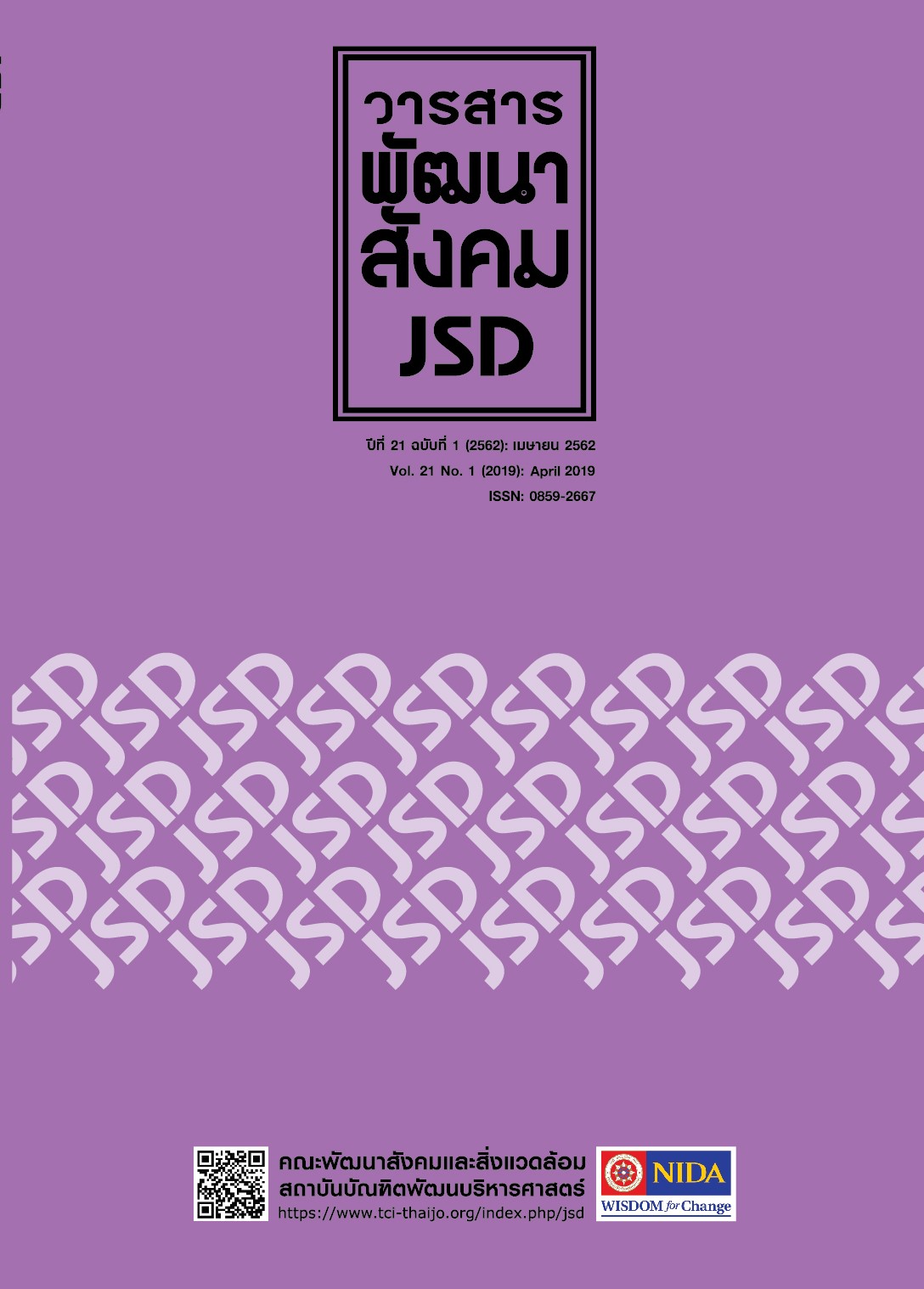Social Network of Marathon Runners
Main Article Content
Abstract
The research is to examine a social network of a marathon runner group in the light of its types, processes, and impacts. This paper proceeds with qualitative method. It found that the aforementioned group is classified as an activity-based network. The major factors of creating a network are an identical preference and a social circumstance, regardless of location. In addition, a network establishment can be divided into four stages namely, 1) primary settlement, 2) management, 3) improvement and maintenance, as well as 4) expansion. The network exerts social, economic, and political impacts.
Article Details
How to Cite
Rakpuang, S. . (2019). Social Network of Marathon Runners. Journal of Social Development and Management Strategy, 21(1), 95–114. Retrieved from https://so04.tci-thaijo.org/index.php/jsd/article/view/191928
Section
บทความวิจัย Research Article
References
Aieophuket, C. (2014). Application of Analytical Hierarchy Process for Investigating Satisfaction Factors in Organizing a Marathon Running Event. [in Thai]. Kasetsart University, Bangkok.
Apakaro, S. P. (2004). Network: Nature Knowledge and Management. Bangkok: [in Thai]. Duan Tula Printing House.
BLT Bangkok, (2017). National Economic and Social Development Board. [in Thai]. Retrieved from http://www.bltbangkok.com/CoverStory.
Budsritha, P. (2014). Network construction and network management in the dissemination of Buddhism. Amphoe Thung Saliam Sukhothai Province. [in Thai]. National Institute of Development Administration, Bangkok.
Chanpongsri, S. (interviewed, December 9, 2017)
Chareonwongsak, K. (2000). Network Management: Key Strategies for the Success of Educational Reform. Bangkok: [in Thai]. Future Institute for Development Studies.
International Association of Athletics Federations (2015). Participant Statistics. [in Thai]. Retrieved from http://www.chombuengmarathon.com/th/past_static
Jantawong, S. (interviewed, October 25, 2017)
Jiroajvanichakorn, R. (interviewed, November 24, 2017)
Kaikaew, T. (2013). The Social Network-Making: A Case Study of Amateur Soccer Players in the Northern Bangkok Area. [in Thai]. National Institute of Development Administration, Bangkok.
Keawthep, K. (1995). Community Cultural Work Tool. Bangkok: [in Thai]. Catholic Council of Thailand for Development.
Kongmalai, A. (interviewed, April 5, 2018)
Lertsukittipongsa, P. (interviewed, December 5, 2017)
Nateethanasarn, K. (interviewed, December 7, 2017)
National Statistical Office (2008). The 2007 Exercise Behavior Survey. [in Thai]. Retrieved from http://service.nso.go.th/nso/nsopublish/service/survey/excerRep50.pdf
Nirathon, N. (2000). Networking: Some Considerations. Bangkok: [in Thai]. Thammasat University.
Ponsri, S. (2007). Learning Network in Community Development. Bangkok: [in Thai]. I.O. Printing House.
Rangsom, P. (2009). Marketing and opportunities of bamboo wicker housewife group Rai Lak Thong Phanat Nikhom Chonburi. [in Thai]. National Institute of Development Administration, Bangkok.
Ratnatilaka Na Bhuket, P. (2009). Organization and management. Nonthaburi: [in Thai]. Think Beyond Book.
Samutthong, I. (interviewed, October 17, 2017)
Sangkapo, S. (interviewed, October 25, 2017)
Saonuam, P. (interviewed, January 31, 2018)
Somsiriwong, K. (1989). Group and group work in general promotion principles. Bangkok: [in Thai]. Kasetsart University Promotion and Training Center.
Supasap, T. (interviewed, October 10, 2017)
Techaatik, S. et al (1994). Potential and network of villager’s leaders, guides and directions for developing villagers' leaders to solve rural problems. Bangkok: [in Thai]. Chareon Karnpim.
Tiammek, N. (interviewed, November 14, 2017)
Vilairat, P. (2014). Sport for Health: How Good for Us. [in Thai]. Retrieved from https://www.pantown.com/group.php?display=content&id=36749&name=content70&area3
Viset, S. & Boonserm, N. (2004). Community watershed management. Bangkok: [in Thai]. Duan Tula Printing House.
Apakaro, S. P. (2004). Network: Nature Knowledge and Management. Bangkok: [in Thai]. Duan Tula Printing House.
BLT Bangkok, (2017). National Economic and Social Development Board. [in Thai]. Retrieved from http://www.bltbangkok.com/CoverStory.
Budsritha, P. (2014). Network construction and network management in the dissemination of Buddhism. Amphoe Thung Saliam Sukhothai Province. [in Thai]. National Institute of Development Administration, Bangkok.
Chanpongsri, S. (interviewed, December 9, 2017)
Chareonwongsak, K. (2000). Network Management: Key Strategies for the Success of Educational Reform. Bangkok: [in Thai]. Future Institute for Development Studies.
International Association of Athletics Federations (2015). Participant Statistics. [in Thai]. Retrieved from http://www.chombuengmarathon.com/th/past_static
Jantawong, S. (interviewed, October 25, 2017)
Jiroajvanichakorn, R. (interviewed, November 24, 2017)
Kaikaew, T. (2013). The Social Network-Making: A Case Study of Amateur Soccer Players in the Northern Bangkok Area. [in Thai]. National Institute of Development Administration, Bangkok.
Keawthep, K. (1995). Community Cultural Work Tool. Bangkok: [in Thai]. Catholic Council of Thailand for Development.
Kongmalai, A. (interviewed, April 5, 2018)
Lertsukittipongsa, P. (interviewed, December 5, 2017)
Nateethanasarn, K. (interviewed, December 7, 2017)
National Statistical Office (2008). The 2007 Exercise Behavior Survey. [in Thai]. Retrieved from http://service.nso.go.th/nso/nsopublish/service/survey/excerRep50.pdf
Nirathon, N. (2000). Networking: Some Considerations. Bangkok: [in Thai]. Thammasat University.
Ponsri, S. (2007). Learning Network in Community Development. Bangkok: [in Thai]. I.O. Printing House.
Rangsom, P. (2009). Marketing and opportunities of bamboo wicker housewife group Rai Lak Thong Phanat Nikhom Chonburi. [in Thai]. National Institute of Development Administration, Bangkok.
Ratnatilaka Na Bhuket, P. (2009). Organization and management. Nonthaburi: [in Thai]. Think Beyond Book.
Samutthong, I. (interviewed, October 17, 2017)
Sangkapo, S. (interviewed, October 25, 2017)
Saonuam, P. (interviewed, January 31, 2018)
Somsiriwong, K. (1989). Group and group work in general promotion principles. Bangkok: [in Thai]. Kasetsart University Promotion and Training Center.
Supasap, T. (interviewed, October 10, 2017)
Techaatik, S. et al (1994). Potential and network of villager’s leaders, guides and directions for developing villagers' leaders to solve rural problems. Bangkok: [in Thai]. Chareon Karnpim.
Tiammek, N. (interviewed, November 14, 2017)
Vilairat, P. (2014). Sport for Health: How Good for Us. [in Thai]. Retrieved from https://www.pantown.com/group.php?display=content&id=36749&name=content70&area3
Viset, S. & Boonserm, N. (2004). Community watershed management. Bangkok: [in Thai]. Duan Tula Printing House.

